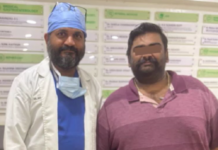New Delhi, March 26, 2019: Iodine deficiency is a major health problem in India. The soil of the subcontinent has little iodine, so food grown on it shows few traces of the element. As a result, all Indians are prone to iodine deficiency disorders. The most popular method of tackling the problem has been to encourage the consumption of iodised salt, which reaches about 92% of Indian households. As per several studies, around 350 million population remains at risk of iodine deficiency disorders that can lead to goiter, hypothyroidism and even brain damage. Iodine is an essential micronutrient required for normal thyroid function, growth, and development.Unknown to many, mere lack of awareness has made iodine deficiency the silent menace in India with around 22% of the newborn and infants being affected by physical and mental retardation. In fact, if a pregnant mother fails to incorporate an adequate amount of iodine in her diet, the child is put at a grave risk of stillbirth, congenital abnormalities, stunted growth and most commonly, poor IQ. Iodine helps in the growth and development of the brain from conception to 7 years of life. Suboptimal intake of iodine causes inadequate thyroid hormone production, which leads to a spectrum of adverse outcomes, collectively termed Iodine Deficiency Disorders (IDDs).
Dr. Chandrakant S Pandav, also known as the “Iodine Man of India”, along with several other Indian Scientists, demonstrated the importance of Iodized salt for freedom from brain damage due to iodine deficiency. In 2015, 92% of households in India consume iodised salt as per National Iodine and Salt Intake Survey (NISI 2014-15). Goitre has virtually disappeared from regions around the country. Over a 2 million IQ points are being saved every year in India. The efforts of Dr. Pandav along with global scientists have led to similar results saving 1.5 billion IQ points every year.
Speaking about the initiative, Dr. Chandrakant S Pandav, Member, National Council on India’s Nutrition Challenges under Poshan Abhiyaan; President, Indian Coalition for the Control of Iodine Deficiency Disorders (ICCIDD), India and also Former HoD, Centre for Community Medicine, AIIMS, New Delhi, said, ” India was one of the first countries globally to start a national IDD control program and the IDD control program in India has evolved over the years. The dynamic evolution IDD control program and the efforts for its sustainable elimination in India has been a success story. We are within the grasping reach of the target of greater than 90% household level coverage of adequately iodized salt of USI. India has been at the forefront of global efforts by contributing to research and program for elimination of IDD.”
In a bid to commemorate the success story of Universal Salt Iodisation (USI) in India and South Asia, Centre for Community Medicine, AIIMS, New Delhi and Iodine Global Network organized a Symposium in New Delhi. The symposium focused on the current scenario as well as the steps required towards sustainable elimination of IDD in India, South Asia and globally. Dr. Chandrakant Pandav was felicitated at the symposium in recognition of his service to science and society for the last 40 years. Dr. Vinod Paul, Member – Health and Nutrition, NITI Ayog graced the symposium.
Speaking about the initiative, Dr. Paul, said, “Salt iodization in India has saved 4 billion IQ point since 1985, 300 million IQ points, every year. In the 1980s, goiter was one of the most common disease not only in humans but also animals, I remember visiting a village at that time when I came across more than half of the population of the village suffering from goiter. We have indeed come a long way in terms of eradicating diseases caused due to lack of Iodine however another 75 million IQ points can be saved if Universal Salt Iodization (USI) is attained.”
Corporate Comm India(CCI Newswire)

























